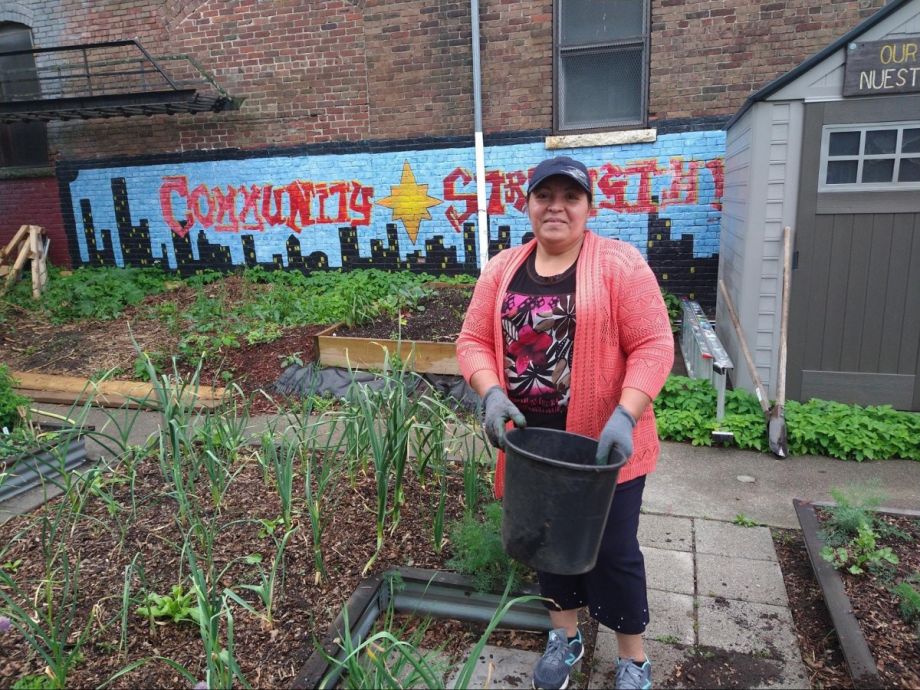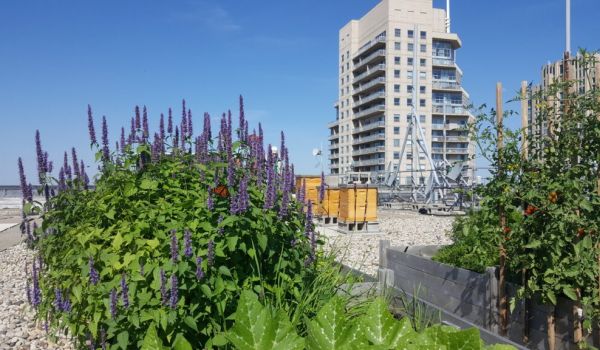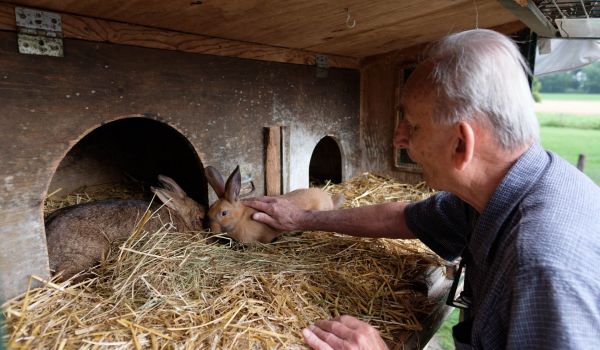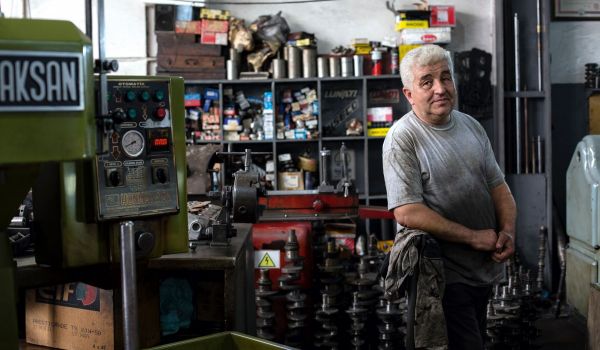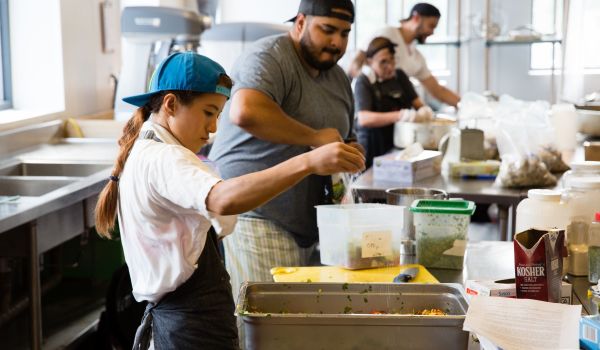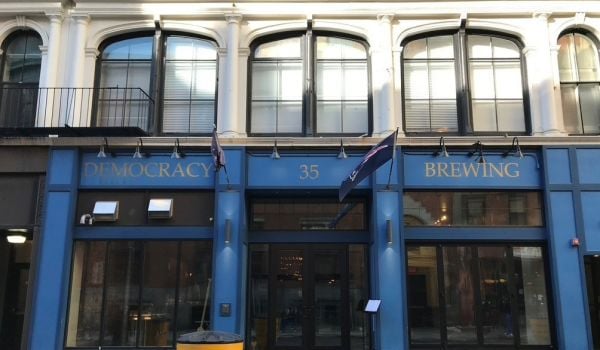This story was originally published by palabra., an initiative of the National Association of Hispanic Journalists, and is republished here with permission.
Juana Sánchez has high hopes for the tomato plants growing in one of the 12 raised beds of Our Garden / Nuestro Jardín in East Boston, Mass. On this overcast spring day, the plants reach just above the tops of her gray sneakers. But by mid-summer, she predicts they will grow as high as the wooden stakes, several feet tall, inserted beside them. Hours after a rainstorm has quenched the plants’ thirst in this communal gardening space, Sánchez moves about nimbly. A baseball cap covers her black hair, and a coral-colored sweater keeps her warm. When she uproots an eggplant with her gloved hands, she notices insects are injuring the plant. Sánchez, a Salvadoran immigrant who serves as the site’s managers, surveys the beds, each one marked with the name of its crop in English and Spanish, from ajo or garlic to elote or corn.
Sánchez also keeps an eye on what happens beyond the garden fence. There’s a man sleeping on top of a nearby concrete wall. She says he sometimes harasses her. She’s grateful that a group of construction workers renovating a building next door recently intervened to help.
One of seven sites run by a nonprofit called Eastie Farm, Our Garden / Nuestro Jardín is a calm space in a congested neighborhood near the Boston waterfront and Logan International Airport. “It is a very beautiful site,” Sánchez says in Spanish. “I feel very happy … here in the garden, planting, working, forgetting everything, forgetting the stress of everything.” She also enjoys sharing her knowledge with young visitors from the Mario Umana Academy K-8 across the street.
Research indicates that Latinos are increasingly joining – and finding purpose in – gardening. When the National Gardening Association surveyed Americans about their gardening activities last year, it found that just over half of Latino or Hispanic respondents (51%) said they participated in any new garden or lawn activities, while slightly under half (49%) engaged in garden or lawn activities more often in 2021 than in 2020.
Gardening helps relieve stress, including from the pandemic, and provides an affordable source of fresh food, while reconnecting Latino immigrants with traditions from their homeland. Yet, the areas where many gardens are located – often low-income, inner-city neighborhoods – are plagued by crime, pollution and gentrification.
Sánchez has been gardening since childhood. As a 10-year-old in El Salvador, she learned about tropical crops, such as papaya, mango, guava and sugar cane. In 2021, she told the Boston-based Spanish-language newspaper El Planeta that the garden had a life-changing impact on her. When she immigrated to the U.S., she was living on a carbohydrate-heavy diet of corn tortillas, bread, yucca and sweets. Diabetes, according to the article, left her bedridden. She credits Eastie Farm with inspiring her to eat healthier and become a vegetarian.
Eastie Farm, which dates to 2015, has been steadily turning vacant lots in Boston into green spaces and sharing its harvest with the community. Sánchez joined the organization in June 2020, during the pandemic, a time when there was increased interest in efforts to feed the hungry and combat isolation due to Covid.
Our Garden / Nuestro Jardín is a space for birds to chirp and bunnies to hop, although Sánchez notes that these visitors like to help themselves to the crops that grow in the garden.
On Wednesdays, Sánchez works in the garden with a volunteer, Sarah Holden. Sánchez only speaks Spanish and Holden mostly speaks English, yet they work in sync.
“She shows me how to do something and I will follow suit,” Holden said. “Juana works really, really hard. Without her, I don’t think the garden would be possible.”
Gardening vs. Development
At two separate Boston community gardens – Our Garden / Nuestro Jardín in East Boston and El Jardín de la Amistad in Roxbury – construction projects are taking place right next door. A planned demolition delayed this year’s growing season at El Jardín de la Amistad. Coordinator Marcos Beleche covered the 20 beds with protective material in case of asbestos or lead contamination. By late May, the covers had finally come off and spring planting began. Wearing a broad-brimmed canvas hat, a sky-blue short-sleeved buttoned-down shirt and cargo shorts, Beleche was excited to get back to gardening.
“It’s an opportunity I have to connect cultures, food heritage backgrounds,” said Beleche, who is Mexican American and holds leadership positions in multiple community gardening initiatives across Boston.
Growing up in San Diego, Beleche remembers that he did “not necessarily have a positive experience” with growing food. “It reflected some of the challenges around labor exploitation, access to the food you grow,” he said. But as an adult his views have evolved. “I grow stuff I like to eat. Gardening became a lot more focused, being that connection to my own cultural heritage. I also became a vegetarian, which challenged me to be able to create some of the food dishes without meat,” he said. “It’s an opportunity to really embrace food sovereignty, explore some of the traditions around what you would call quelites in Mexico, seasonal edible eats, harvesting amaranth or callaloo that pop up every spring.”
A Latino presence is sprouting in community gardens across the country, according to Rachel Surls, the sustainable food systems advisor for the University of California Cooperative Extension in Los Angeles County.
“I feel comfortable saying that with the surveys from the National Gardening Association, they indicate there is an upward trend,” Surls said, adding, “There are some suggestions that urban farms – let’s extend that to community gardens – may be more diverse than traditional farms.”
El Jardín de la Amistad was established in the 1980s. Back then, Beleche said, the neighborhood was troubled by issues including vacant lots, arson and drug use. A group called La Alianza Hispana spearheaded efforts to transform one vacant lot into a garden. When Beleche joined, about four years ago, membership was 100% Latino; now it is just over half Latino, with Cape Verdean, African American, Asian and White gardeners also participating.
After passing through the chain-link fence that surrounds the garden, and then an archway, you enter a peaceful world, accentuated by the presence of St. Patrick’s, a Catholic church across Dudley Street. Carmen La Torre, a native of Aguadilla, Puerto Rico and one of the garden’s earliest coordinators, says the area is quiet today, relatively free from thefts and shootings. The garden is one of 56 gardens in the Boston area run by a statewide organization, the Trustees of Reservations.
Despite gardening’s growing popularity, barriers to access remain for low-income, inner city communities of color. “There’s usually a fee for participating in a community garden to cover water (to irrigate the crops),” Surls said. “Many recent immigrants are without finances, getting settled, perhaps working multiple jobs. It can be hard to even afford a low fee.”
Eastie Farm does not charge a fee. But at El Jardín de la Amistad, there is a $40 fee that includes water. There’s also the issue of waitlists, which Eastie Farm does not have but which exist at El Jardin de la Amistad and many of the Boston community gardens managed by the Trustees of Reservations. The current wait for a plot at El Jardĺn de la Amistad fluctuates between one to two years, according to Beleche.
Soil quality is another challenge urban gardens face. “It’s really important to test soil and make sure it doesn’t have lead or other heavy metal pollutants,” says Surls. But she adds that community gardens “may not have the resources to spend (on testing).”
“I often thought, working with gardens and farms in LA, so many people who come to LA are farmers without a farm,” Surls reflected. “They grew up on the land … whether (in) El Salvador, Mexico, Honduras or somewhere else in the world, they come with all kinds of knowledge and lived experience, they have so much to share.”
However, as more Latinos join community gardens and urban farms, Surls notes a troubling irony.
“There has been at least one study suggesting if you put a community garden into an underserved or under-resourced neighborhood, it can potentially lead to an increase in property values around the neighborhood,” she said. “When a community garden goes in and makes the property values go up, it can intensify gentrification.”
Both Our Garden / Nuestro Jardín and El Jardín de la Amistad are decorated with colorful murals. At Our Garden / Nuestro Jardín, the words “COMMUNITY” and “STRENGTH!,” separated by a painting of the sun, accompany a skyline image. At El Jardín de la Amistad, the message “NUESTRA IDEA / OUR PRIDE,” rises above the vegetation on a wall featuring Caribbean flag motifs. The mural is marred by graffiti, and the building it is painted on has blocked-up windows and is slated to be demolished.
Change is also underway in East Boston. Of the three core members of the Eastie Farm team that distributed food to the community during the pandemic, two have had to leave their homes due to displacement, according to the nonprofit’s website.
“All of this is disappearing due to gentrification,” said Eastie Farm volunteer Zaida Adames, a native of Ponce, Puerto Rico who belongs to an anti-eviction organization called City Life / Vida Urbana. “People are being forced out by developers. Who can afford these rents? I think it’s a way for poor people to not live in this area any more. It’s sad, heartbreaking.”
She added, “We have to hold politicians accountable and help the community stay a community. There would have been a lot of evictions if the pandemic didn’t happen.”
During the pandemic, the Commonwealth of Massachusetts instituted an eviction moratorium that expired in October 2020. An eviction moratorium from the Centers for Disease Control and Prevention ended last August. The Massachusetts state government website notes that some local eviction moratoriums may remain within municipalities.
In Roxbury, Beleche laments that longtime Caribbean, Cape Verdean and African American communities are also being displaced. He notes that condos are going up and high-income professionals are moving in, eager to walk to work or take the buses that leave from nearby Nubian Square. Formerly known as Dudley Square before its 2019 renaming, Nubian Square is just blocks away from Boston’s hospitals and art museums.
“(Besides) beautifying and improving the neighborhood and the physical infrastructure, there is also increasing rents and putting pressure on the housing market,” he said.
Beleche hopes that El Jardín de la Amistad can endure despite these changes.
“Gardening, open space, is so fundamentally important,” Beleche said, adding that it benefits both one’s overall health and the community. “It’s just the impact of open space on day-to-day mental health. The ability to have access to open space, safe open space, is really important. In many ways, growing your own food, growing food connected to your culture, validates you.”
Rich Tenorio is a writer and editor whose work has appeared in a variety of media outlets. He is a graduate of Harvard College and the Columbia University Graduate School of Journalism.Tenorio is also a cartoonist.

